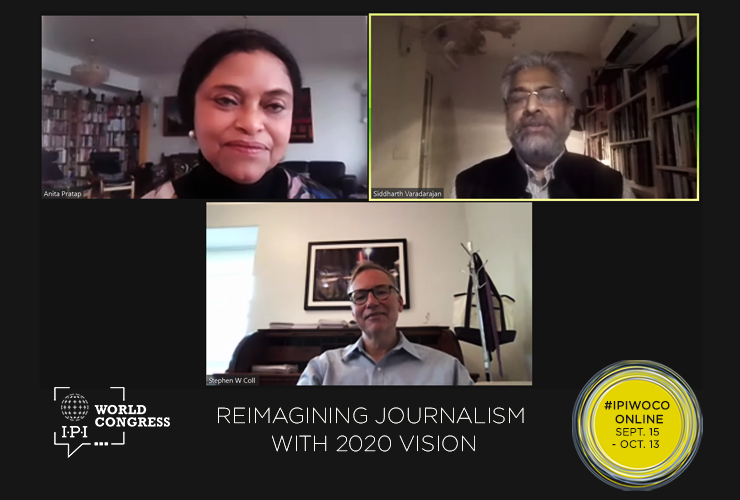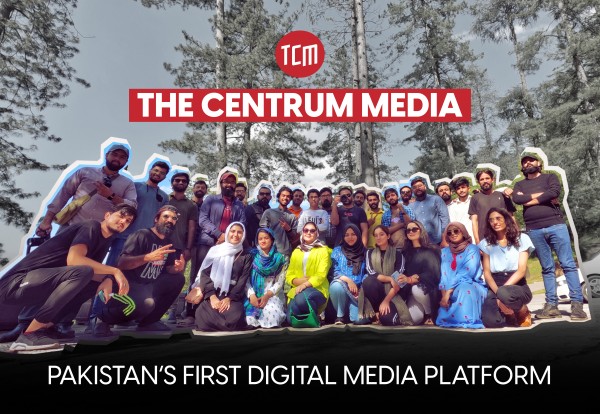Recalling a time when journalism was widely respected, when journalists reporting from Afghanistan in the 90’s could mark their vehicles as press and be considered off-limits, Steve Coll, journalist and dean of the Columbia Journalism School acknowledged he was fortunate to be of a generation of correspondents who weren’t the target. “That concept has completely vanished” he told the IPI World Congress. “Combatants and leaders alike no longer need the press to tell their story, they use social media to do it themselves”.
Coll was in conversation with founding editor of The Wire Siddharth Varadarajan about journalism under their respective populist leaders: Indian Prime Minister Modi and US President Trump.
For Varadarajan, Modi has a smarter approach than Trump. “It’s rare to find statements by Modi against the media, he assigns that role to others,” he said. The Indian Prime Minister addressed his first press conference 5 years after assuming office.
Please accept cookies to access this content
“I think that if Trump was reelected for another 4 years, we would start seeing similar things to what’s happening in India,” said Coll, “the link between attacks on journalists and the president’s incitement against them is disturbing,” he continued, referencing the bomb that was sent to the CNN by a Trump supporter in 2018.
FAKE NEWS – THE ENEMY OF THE PEOPLE!
— Donald J. Trump (@realDonaldTrump) December 7, 2018
According to Coll, Trump is a “creature of the media,” with fame being one of his most profitable businesses. “I think Americans have a sense for the subtleties in his performances, but the problem is when the language he uses lands in other countries where there is an even greater impunity for attacking the press and authoritarians who seek to muzzle it and make sure no one holds them accountable”. Coll went on to say Trump has done enormous damage to the constitution, “particularly to the function of the press – and even greater harm by normalizing incitement and allowing authoritarians worldwide to do that same”.
Frivolous litigation a pressure tactic
While there is real danger for journalists in India, with 3 journalists killed for their work since the beginning of the year, there are other tactics used to silence journalists.
If there is one thing Varadarajan does not like to see in the office, it’s “the postman delivering fat bundles of court papers, connoting that somebody has gone and filed a defamation case against us and will tie us down with frivolous litigation.”
It is not the fear of incarceration or a day in court that concerns Varadarajan, but rather the understanding that preparing the necessary legal responses forces The Wire staff to waste time and money they do not have. “The form that pressure on the media takes in India, is to tie you down with legal procedure.”
Culture of Impunity
“Authoritarians and their allies know that they won’t face any consequences, neither in national nor international justice systems, for violently silencing the press,” stated Coll. “In the international system, the only accountability is naming, shaming, and advocacy.”
But Varadarajan believes global coverage does have some positive impact. “It’s not only the press suffering at the hands of autocrats,” he said “but also academics, writers and even students who are being trolled by private individuals as the public-sphere becomes more viscous.” Varadarajan said this creates a chilling effect with a wide impact, and that “acts of global solidarity and honest reportage do play a role. When you’re under pressure and organizations issue statements all over the world, it does a lot for morale”.
Journalism Can (Still) Move the Needle
“Despite polarization in society, the media can still play a role in holding powerful individuals accountable, even in the Trump administration” said Coll, citing Politico’s 2017 reveal which forced the resignation of Health Secretary Tom Price. While questions regarding trust in the media, its financial future and digitization impact may arise, Coll believes the right question is whether or not “the press can carry out its constitutional function of making the impact of governmental policies transparent to the public”.
Please accept cookies to access this content
Varadarajan agreed that “we have to stick to the rules and what our profession is all about, which is objectivity, factuality and accuracy. We see too much opinion mongering disguised as news – people are fed up with that. I believe the public will recognize media platforms that don’t meld editorial opinion with news coverage.”
Coll and Varadarajan also stressed that alongside safeguarding the ethics of journalists, it is important for journalists to work in organizations that protect them as well. “Stand your ground and pick your battles,” advised Varadarajan and Coll added that “no story is worth dying for”.
This International Press Institute World Congress session entitled “When Journalism is at Work, not at War”, was moderated by contributing editor of The Week Anita Pratap on September 29.




